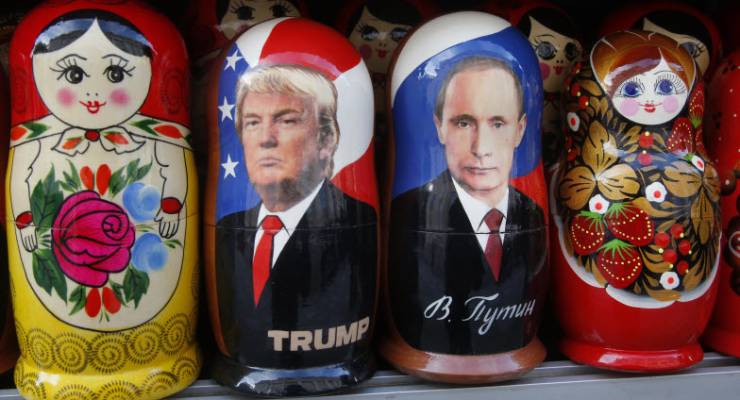
One of the most worrying features of President Donald Trump’s election victory was the near-unanimity with which the conservative establishment rallied behind him. That’s been less pronounced in Australia, where some prominent conservatives are still Trump-sceptics, but even here it’s remarkable how many have deserted their old policy commitments in solidarity with the new strongman.
So it would be easy to read Tom Switzer’s piece this week in the Fairfax papers, “In defence of Trump’s Russia policy“, as an example of this bandwagon effect. Weren’t conservatives all supposed to be anti-Russia until Trump said otherwise?
But although there are hints there of a fealty to Trump, in fact this is no sudden conversion. Switzer, a former research fellow at the Institute of Public Affairs and now senior fellow at the US Studies Centre at Sydney University, has always been a committed “realist” in foreign policy. And realists have something important to say about Russia that is quite independent of Trump’s fondness for Vladimir Putin.
The realist school stands in opposition to the “idealists”, who want foreign policy to concern itself with the promotion of democracy, human rights and the like. Realists don’t worry about those things; for them, a foreign country is like a black box whose internal workings are of no concern to outsiders. What matters is the preservation of peace and promotion of America’s international interests.
In the hands of people like Henry Kissinger, the realist attitude easily slides into a view that authoritarian regimes are actually preferable to deal with, and that democracy is dangerous because it allows impractical idealists to dictate policy.
Even in its own terms, realism runs into problems. In the long run, the correlation between democracy and peace is very strong, and dictatorships end up being more unstable as well as more belligerent. And if America’s interests include the interests of its giant arms manufacturers, then even the preservation of peace can take second place.
So it’s really no surprise that the period of best relations with Russia came when Russia was most democratic, and that the slide towards confrontation in recent years has coincided very closely with Putin’s domestic shift towards greater authoritarianism.
Switzer neglects that side of the argument. He attributes distrust of Russia to Democrats being “completely unhinged by Trump’s victory”, describes the 2014 popular revolution in Ukraine as a “Western-backed coup” and dismisses charges of Russian hacking by saying “lots of hacking goes on all the time”.
Nonetheless, realists do have something valuable to contribute, and an unbridled idealism can be almost as dangerous as unbridled realism. It was realists, including Switzer himself, who provided some of the strongest opposition to the invasion of Iraq, and for all his apparent deference to the Kremlin, Switzer makes some important points:
“Why interfere in the near abroad of a great power with a vast arsenal of nuclear weapons? Have years of NATO and EU expansion to the former Soviet Union’s frontiers upset Russian sensibilities? Why do NATO military exercises from the Baltics to Black Sea unnerve Moscow?
“Why make threats and commitments to Russia and the Baltics respectively when Western governments are unable or unwilling to honour them? Will a war-weary America really commit blood and treasure to a region where no US army has ever fought and where Russia commands greater military superiority?
“Why can’t America and Russia work together to fight Islamic State jihadists, help create a political settlement in Syria, keep Iran’s nuclear ambitions in check and reduce each other’s nuclear weapons?”
It’s one thing to say, as I and other idealists would, that the best security for international peace and co-operation would be a genuinely free and democratic Russia. The problem is that there is no obvious way for Western policy to achieve that goal; in an imperfect world, we sometimes need to work towards second-best solutions.
And it’s perfectly true that American policy towards Russia was badly mismanaged in the early post-Soviet period. Cold War attitudes drove an expansion of NATO and disregard of Russian interests that just played into the hands of hardliners like Putin.
We can’t now go back and undo those mistakes (largely made by realists, but we’ll let that pass). Twenty-five years ago, a genuine partnership with Russia would have been possible; now, a detente based on some hard-nosed realist interests is probably the best we can manage. But that’s still a lot better than some of the alternatives.
Putin will not be there forever, and Russia’s democratic opportunity will come again. Even now, Russian priorities are mainly defensive, and there is considerable potential for finding common ground if the West is willing to make the effort. Trump’s motives for moving that way are discreditable, but as Switzer says, “that does not necessarily undermine the soundness of an argument”.
In the brave new world of government-by-angry-Twitter-message, Trump’s response to his anti-Russian critics has actually been one of the least foolish:
“Having a good relationship with Russia is a good thing, not a bad thing. Only ‘stupid’ people, or fools, would think that it is bad! We have enough problems around the world without yet another one.”








Crikey is committed to hosting lively discussions. Help us keep the conversation useful, interesting and welcoming. We aim to publish comments quickly in the interest of promoting robust conversation, but we’re a small team and we deploy filters to protect against legal risk. Occasionally your comment may be held up while we review, but we’re working as fast as we can to keep the conversation rolling.
The Crikey comment section is members-only content. Please subscribe to leave a comment.
The Crikey comment section is members-only content. Please login to leave a comment.